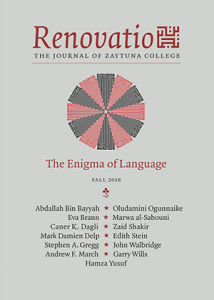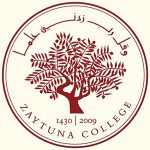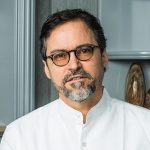Renovatio Journal 4 (Vol.2, No.2 Fall 2018): The Enigma of Language

Editor-in-Chief: Hamza Yusuf
Publisher: Zaytuna College
Year of Publication: 2018
Print Length: 132 pages
Genre: Islamic Studies / Theology, Ethics and Philosophy; Hadith, Sunnah & Sirah, History, Science, Qur’anic Studies; Non-Fiction / Religious Studies
Topic: Muslim, Islam, Qur’an, Prophet Muhammad ﷺ, Ethics & Morality, Metaphysics, Reality, Language & Literature, Scholarship & Knowledge, Cultural Heritage/Legacy, Colonialism & Post-Colonialism, Modernity, Modernism, Modern; Postmodernity, Postmodernism, Postmodern; Religion, Religious Thoughts & Philosophy
Renovatio (renovatio.zaytuna.edu) is a Muslim journal about the ideas that have shaped our past and present world. We ask scholars, theologians, and writers to examine timeless questions and today’s moral challenges by drawing from the enduring texts of revelatory faith traditions and current thinking from philosophy, theology, and ethics to history, politics, the social sciences, and beyond.
Vol.2 No.2: The Enigma of Language
In modern intellectual life, the definition of language remains unsettled. Is it thought—or, is it an expression of thought? For the fourth issue of Renovatio, we chose “The Enigma of Language” as a broad theme because the free and virtually limitless nature of language might be the stubborn holdout to the prevailing concept of a world without spirit. If we reflect on the reality of language, might we begin to renew our trust in both words and things?
Table of Contents
Contributors
1. Self Addressed Speech – Eva Brann
Speech may be for communication, but when the soul speaks to itself, who is communicating with whom?
2. The Listening of the Soul – Zaid Shakir
Speaking distinguishes the human, but the soul’s capacity to listen helps us fulfill our human potential.
3. “Using the Brain You Gave Me” – Garry Wills
Words may be the way that we learn and understand, but, shows Augustine through a dialog with his son, God is the only real teacher.
4. Of Cannons and Canons – Oludamini Ogunnaike
Colonialism universalized modern Western education. As we wrestle with this often bitter legacy, why do calls to “diversify” what we read fall short?
5. The Covenant of Language – Mark Damien Delp
In an age when even the idea of truth awaits trial, how do we renew our trust in words and things?
6. The Wisdom of Lamentation – Stephen A. Gregg
The Book of Job doesn’t simply preach patience to one who suffers. Job’s speech—and his silence—dismantles platitudes and invites us to find resolution in an experience of God.
7. Knowledge, Truth, Being – Edith Stein
When a knowing mind has known a being, do we arrive at truth?
8. Breaking the Language Barrier – John Walbridge
The Han Kitab teaches that the Islam found in the Arabic and Persian books is only one possible way in which the Islamic revelation can be expressed.
9. The Centrality of Language in Islam’s First Years – Abdallah bin Bayyah
The early generations of Muslims, including the Companions of the Prophet ﷺ, enjoyed an extraordinary relationship with the arts of language.
10. The Liberal Arts in An Illiberal Age – Hamza Yusuf
When we lose the language arts, we lose our ability to understand the metaphysical implications of language and thought, and we are no longer free to think.
11. Can We All Treat Blasphemy as Taboo? – Andrew F. March
Should Muslims accept a moral perspective about blasphemy that’s grounded in liberal ethics?
12. Language is Not Mechanical (and Neither Are You) – Caner K. Dagli
Modern philosophers and scientists are committed to the idea of world as machine, and yet they cannot explain language without the immaterial mind.
13. The Truth A Building Speaks – Marwa al-Sabouni
To be erected, buildings need more than brick and mortar; they need a hierarchy of crucial decisions, which ultimately reveal what we value.
About Zaytuna College

Zaytuna College was founded in Berkeley, California, with a mission to educate and prepare morally committed professional, intellectual, and spiritual leaders who are grounded in the Islamic scholarly tradition and conversant with the cultural currents and critical ideas shaping modern society, through a traditional liberal arts education.
Source: https://zaytuna.edu/about
More from Zaytuna College in this library, click here.

Hamza Yusuf is president of Zaytuna College in Berkeley, California, the first accredited Muslim liberal arts college in the United States. A leading proponent of classical learning, the traditional liberal arts, and great books education in both the Western and Muslim traditions, he has translated, authored, and coauthored numerous publications, including scholarly books and articles as well as papers on major current areas of ethical concern. He holds traditional advanced degrees (ijazaat) in Islamic law and theology, as well as a BA in Religious Studies (San Jose State University) and a PhD from the Graduate Theological Union in Berkeley, California.
Source: https://sandala.org/pages/about-us
More from Hamza Yusuf in this library, click here.
